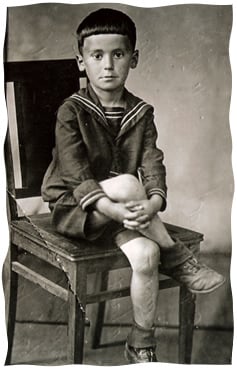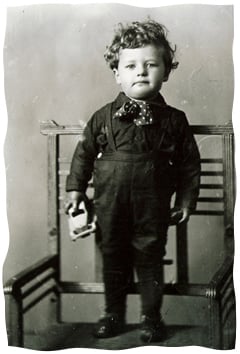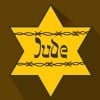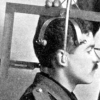It's Sunday, June 22, 1941. At the first sight of dawn, an intense voice explodes from the loudspeakers, waking up the peacefully sleeping residents of Minsk, Belarus. Echoing through the empty streets, parks and squares, it proclaims that at 4 a.m., German tanks invaded Russian territory. The pleasant, summer day promising to bathe the capital city in warm sunlight now is plunged into darkness— chilling, petrifying darkness.
My grandma's mother, Chira, who lives next door, bursts into her daughter Asya's apartment crying: "War!" My grandma's boys, Adik, seven, and Emil, four, seeing the terror in their grandma's eyes, start sobbing. Chira rushes to them, hugging them and covering their faces with kisses: "Shh, my little feigeles (birds)," she whispers though her tears. "I am here. I am with you. Your grandma is here."
She bursts into her daughter's apartment, crying "War!" "Asya, we need to leave the city," she turns to her daughter, my grandma. "I've heard what Germans do to Jews in Poland," she says in a lowered voice, pressing her grandsons closer to her for protection. My grandma, still in shock, folds her hands on her chest, trying to calm her racing heart: "Mama, I can't leave without my husband. You know he is on a business trip in Brest. I need to stay home and wait for him."
Oh, my dear grandma, what you don't know is that at this very moment, at a chaotic train station, your husband Zalmon is desperately trying to make it to a train, back to Minsk, back to you and back to his sons. That right at this train station he is mobilized into the army and now is boarding another train, which will take him to the front-line, into the midst of the war, where he will fight for his country, for you and for his sons.
You also don't know that your hometown, Minsk, will be occupied by the Germans on the fifth day of the war and that you and your entire family— parents, sisters, brothers, cousins, nephews and nieces— will be stopped by German troops twenty five kilometers east of Minsk, and placed in the Ghetto. And inside this barb-wired horror camp you'll be kept worse than prisoners, like cattle, forced to do heavy labor till exhaustion, and often till death.
Nazis need strong people who are able to work, but my grandma's small boys, Adik and Emil, and her elderly parents, Chira and Gershe, are of no interest to them. So while my grandma is out working in the fields, they are taken to the gas chamber. Because they are useless Jews, they are killed, along with the rest of my grandma's family.
I remember when my grandma would light a candle on the anniversary of her family's death and I would ask her: "How did you survive when you came back from work that day, walking into your dead-empty barrack?"

She looks at me with her sad blue eyes glowing in the candle light, tears rolling down her cheeks; her voice shakes as she says: "I wish you will never know."
Then she places pictures of her boys and her parents by the candle, gently touching their faces with her trembling fingers and whispering to them in Yiddish through the heavy rain of tears. And as I look at their innocent faces, in my mind I see how, on a hot, late afternoon in July, they are walking barefoot, holding hands along the dusty path to the gas chambers. How the orange sun hanging low on the horizon reflects on the guns of the German guards. "Do they know that this is their last walk and last sunset?" I think. My heart begins to ache and my eyes burn with tears.
Do they know that this is their last walk and last sunset? Grandma turns to me and squeezes my hand: "That night," she pauses, "after the Nazis killed my boys and my parents, I was howling and ripping my hair out, wanting to die so badly. I couldn't stand the pain and dug my face into my boys' pillow, still carrying their precious scent, praying to G‑d to take my life. But G‑d didn't. He had different plans for me. She looks at me with endless love: "If I'd died that day, I would not have your mama or you. I would have let the Nazis win by killing the hope of my future. I wanted love and life to prevail, in spite of their un-G‑dly plans." She hugs me tightly and I feel her tears on my face. "I love you grandma," I whisper, "Thank you for staying alive."

We sit in silence for a while, each possessed by our thoughts. She then tells me the story of her escape from the Ghetto.
On a fresh sunny day in early October, an older man on the horse and carriage from the local village enters through the guarded gates of the Ghetto. My grandma has been watching him for a few months now, as he brings flour, meat and milk into the camp. She notices when the carriage is left unattended. She has a plan to hide underneath the plush straw and exit the Ghetto with the man, going back to his village.
So when the time is right, she sneaks over, crawls into the carriage, and lies on the bottom. She barely breathes as she hears the loud barking of a German shepherd dog, sniffing around the carriage and trying to jump inside. Her heart almost stops as the dog digs through the straw, scratches her arm and now barks like crazy, calling its master. Grandma starts praying as she hears boots stomping toward the carriage. The German soldier bends over the carriage right above her and, spreading the straw, uncovers her face. In that moment their eyes meet and they both freeze. This second seems like eternity. Then suddenly the soldier covers Grandma back up with the straw and pulls his dog away, yelling to the guard: "Let him out!"
Their eyes meet and they both freezeThe wooden gates squeak open and the horse slowly moves away from the Ghetto, pulling the carriage with Grandma, crying in relief, underneath the damp straw.
As they arrive at the village, occupied by Germans, the man's wife comes out to the front yard to meet her husband and help him unload. My grandma slowly sits up, revealing her presence to them. The husband and wife gasp. If Germans see them hiding a Jew they will kill them on the spot. But my grandma's eyes, full of pain and grief, stop them from turning her in, and instead this brave couple hides her in the narrow space between the walls of their kitchen. A few days later, she is transported the same way she escaped from the Ghetto, underneath the straw of the carriage, into the depth of the Belarusian forest, joining the army of resistance and fighting the invaders courageously.
As the war comes to an end, my grandma starts writing letters to all the hospitals throughout the country, looking for her husband, but receives no response. Still, the hope of finding him glows like the light of the candle in her small wooden house, keeping her warm.
And then in July of 1944, when Minsk is liberated from the German occupation, my heroic grandmother returns home—with twenty medals on her chest, awarded for extraodinary courage while fighting in the forests, as a partisan. As she walks through her abandoned apartment, which miraculously withstood all the bombings in the ruined city, she slowly sits down on the chair, looking around. Windows broken, glass and ashes everywhere. She notices something lying at her feet, under an old yellowed newspaper. She bends over and picks up Emil's teddy bear from the floor and, kissing its fuzzy fabric, she collapses—crying. "I am alone, I am all alone…," she groans, never suspecting that her husband Zalmon, who was wounded in one of the battles, is still alive.
As my grandpa's platoon entered the small village a hundred and twenty kilometers from Minsk, a fleeing German threw a grenade, which exploded two meters away from my grandpa, crushing all the bones in his left arm. Unconscious, he was taken to the hospital by his army friends. Now recovering, he has no idea that his wife Asya has been looking for him.
Grandpa sees his wife's handwriting on the envelope and gasps One morning, as my grandpa is dozing in his bed, the nurse comes into the room, looking around at the patients. Her glance stops at Grandpa: "Zalmon Ryskin!" she screams, "I have a letter for you." My grandpa opens his eyes, sees his wife's handwriting on the envelope, and gasps. Blinded by tears, which fall on the bloody bandage covering his disfigured arm, he asks the nurse to open the letter and read it for him. Sobbing and holding my grandpa's hand she tells him that his beloved wife Asya is waiting for him at home.
Ten days later, in his dark green uniform, with his left sleeve hanging half-empty, chest full of high honor medals, he is knocking at the door of his apartment. He almost passes out when he hears his dear wife's voice. She falls on his chest, crying, and for the first time in four years, she is crying happy tears. But there is something he doesn't know. In the midnight silence she tells him about their tragedy— the loss of their sons.
They start their lives over, building it anew on the wreck of the war. My aunt Ira, named after her grandmother Chira, and my mom, Galina, named after her grandfather Gershe, are born a few years later. My bright grandpa manages to graduate from college and grad school together, all in five years. Both my grandma and grandpa work till retirement in their hometown, Minsk.
In 1992, at the age of eighty-two, my grandparents follow their family to America. They even learn some English…
It has been ten years since my grandparents passed away, first my grandmother, then two months later my grandfather. After spending sixty- seven years together on Earth, they joined each other for eternity in Heaven.
And even though my grandparents aren't physically with me, they are always present. Over family dinner we pour sweet Baron Herzog's wine into two extra glasses, one for my grandma and one for my grandpa, so that from Heaven they can have their "L'Chaim" with us. In the evening, before bed-time, as I tell my kids the story of my grandparents. I feel Grandma's warm presence, as sweet as the delicious honey cake she baked. Every time I cook chicken and matzah-ball soup or bake an apple kugel, she is right next to me, adding a special spice— her love. When I am cuddling with my children, I call them tender names my grandma called me when I was little, in Yiddish.
They live on in my son, who is named after them—Zalmon-Asher, and in my oldest son Edik, who was born on the same day and exact same time as my grandparent's boy Emil, but fifty years later, and named after both boys, Adik and Emil.
Behind every Jewish family there is a story, and when I look at my sons, I think of all of them: the six million killed in the Holocaust, as they live in my every word and in my every tear and in every moment I tell their story.









Join the Discussion